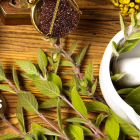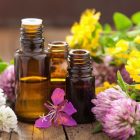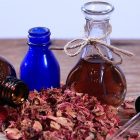Berberine is a bioactive compound that can be extracted from several different plants, including a group of shrubs called Berberis.
Technically, it belongs to a class of compounds called alkaloids. It has a yellow color, and has often been used as a dye.
Berberine is one of the most effective natural supplements available. It has very impressive health benefits, and affects your body at the molecular level. Berberine has been shown to lower blood sugar, cause weight loss and improve heart health, to name a few. It is one of the few supplements shown to be as effective as a pharmaceutical drug.
Natural Sources of Berberine
As mentioned above, berberine is a naturally occurring compound found in several medicinal plants and herbs. It’s usually extracted from the roots, barks, leaves and rhizomes of any of the following plants:
- Goldenseal
- Oregon grape
- European barberry
- Chinese goldthread
- Phellodendron (also known as cork tree)
- Tree turmeric
- Tinospora cordifolia (also known as Guduchi)
- Prickly poppy
- Californian poppy
- Yerba mansa
Berberine is effective for
- Berberine seems to slightly reduce blood sugar levels in people with diabetes. Also, some early research suggests that taking 500 mg of berberine 2-3 times daily for up to 3 months might control blood sugar as effectively as metformin or rosiglitazone.
- High cholesterol. There is early evidence that berberine can help lower cholesterol levels in people with high cholesterol. Taking 500 mg of berberine twice daily for 3 months seems to reduce total cholesterol, low-density lipoprotein (LDL or “bad”) cholesterol, and triglyceride levels in people with high cholesterol.
What else is Berberine good for?
- Depression, perhaps due to increases in noradrenaline and serotonin
- Cancer: Berberine may help suppress tumor growth and spread
- Antioxidant
- Anti-inflammatory
- Infections, including anti-viral effects against the flu
- Non-alcoholic fatty liver disease (NAFLD), as it helps reduce fat build up in your liver



